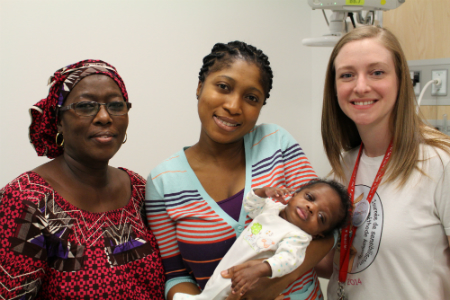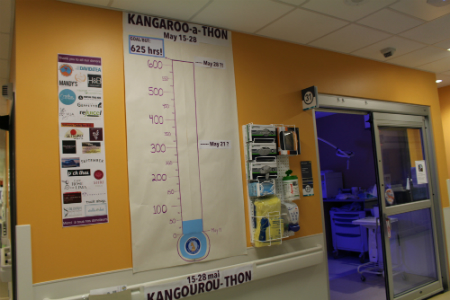Promoting kangaroo cuddles in the Neonatal Intensive Care Unit (NICU)

Encouraging skin-to-skin cuddling provides benefits for parents and babies in the hospital environment
When Naminata Sylla’s first-born son Yannis was born premature at 27 weeks and 2 days old in February 2016, he required a multitude of machines and wires to keep him stable. “The first week, was very hard. I wasn’t able to hold him because he was too fragile,” says Naminata. “I felt helpless in my role as his mother.”
A few days later, Yannis’ condition improved enough that she was able to hold him, and Naminata was told about the benefits of kangaroo care or skin to skin cuddling. A nurse explained that this could not only help Naminata create a bond with Yannis, but had a number of medical benefits as well. “Just like kangaroos carry their babies in their pouch, this helpful practice is a way of caring and comforting babies by having moms or dads hold them skin-to-skin,” says Amanda Camacho, a nurse in the Neonatal Intensive Care Unit (NICU) at the Montreal Children’s Hospital. “This can be particularly beneficial for babies in the hospital environment, by helping to lower stress, pain and infection rates, as well as improving sleep and aiding mom’s milk production.”
Naminata did some online research initially to learn more. “I couldn’t find anything negative about the practice, only about how positive it was both for the mother and the baby!” she laughs, adding that she tried it for the very first time and fell in love. “Words can’t express the feeling of being able to have contact with your baby and to be able to feel like I can contribute to his well-being. In the difficult periods, it gave me courage to keep going.”
Because some babies’ conditions prevent them from being taken out of their incubators, modified versions of kangaroo care can be adopted by parents, and are encouraged by NICU staff. “Parents can practice encircled holding, which involves leaning over a baby’s bed and surrounding them with the warmth of the parent’s body or hand hugging, which involves cupping the baby’s head and legs with a parent’s hands,” says Amanda. “All methods benefit babies by offering them appropriate touch and gentle stimulation.”
 As she happily makes the transition home with Yannis after spending 3 months in hospital, Naminata says that she will most definitely be continuing to practice kangaroo care with her son outside of the hospital. “To know that my body is able to give him the warmth and comfort that he needs and that only I can provide this for him is really special,” she says. “He started off weighing 1030 grams at birth and is now over 7 lbs, and I like to think that I helped him grow stronger.”
As she happily makes the transition home with Yannis after spending 3 months in hospital, Naminata says that she will most definitely be continuing to practice kangaroo care with her son outside of the hospital. “To know that my body is able to give him the warmth and comfort that he needs and that only I can provide this for him is really special,” she says. “He started off weighing 1030 grams at birth and is now over 7 lbs, and I like to think that I helped him grow stronger.”
Given the extraordinary effect kangaroo care has on preterm babies, our patients, families and staff members in the NICU recently launched a two-week kangaroo-a-thon to try to reach a goal of 625 hours of kangaroo care. Launched by Sunnybrook Hospital in Toronto, this international initiative is currently being spearheaded in NICUs worldwide with the goal of promoting a scientifically sound, low cost, and a high impact developmental intervention for baby, mom and dad. Join us in cheering them on as they try to reach their goal!


